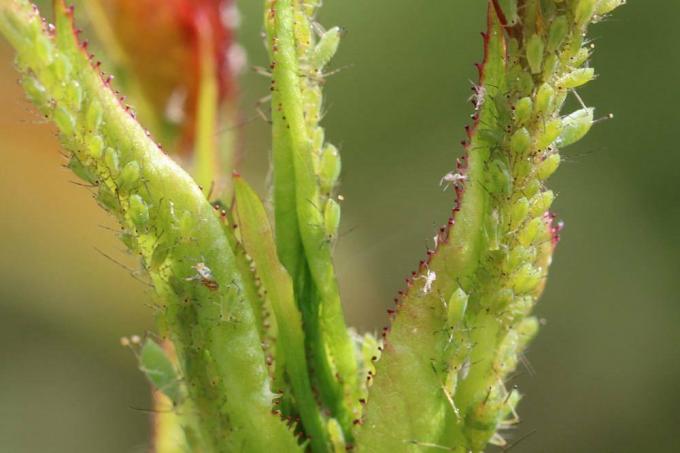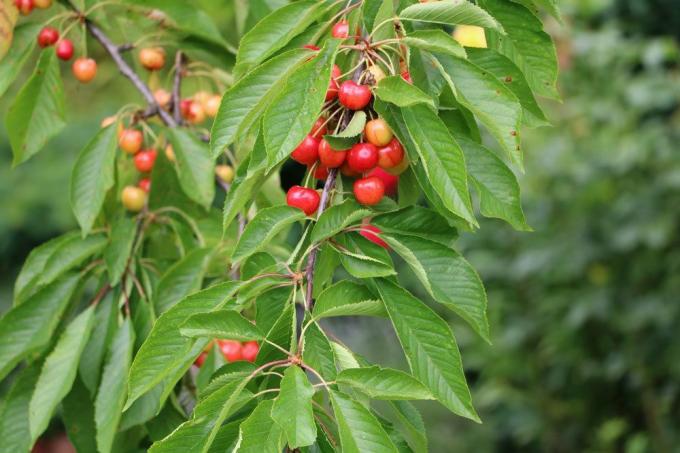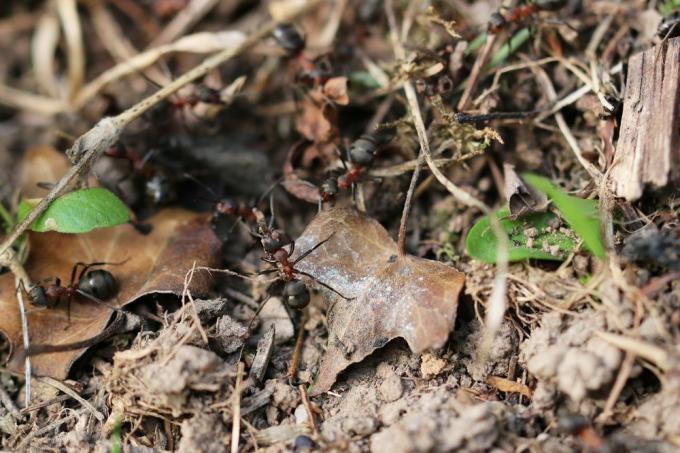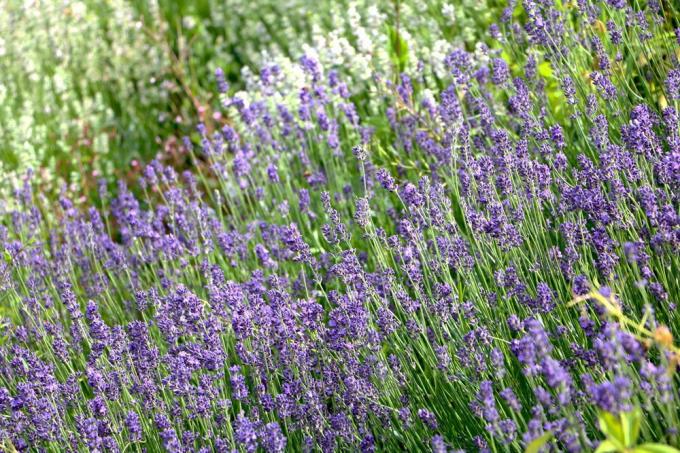
table of contents
- Ant infestation
- Aphids
- Preferred fruit trees
- Tree damage
- Combat
- Relocate ants
While ants can usually become an unwanted nuisance in the house, they act as beneficial insects in gardens. They represent an important part of the ecosystem. As a rule, they cause maximum damage to young plants / trees. However, it usually leads them to fruit trees for a less acceptable reason, which requires swift action to protect the trees and fruit. The plant guide reveals what to do when and why.
Ant infestation
Reason for an ant infestation
If the Formicidae walking around in the garden, this usually does not bother any hobby gardener or garden owner - usually the opposite is the case. They distribute seeds in nature, keep various pests out of the gardens and aerate the earth. But when they climb a fruit tree en masse, it is mostly aphids and / or leaf fleas behind them. Ant migration on trees does not normally take place unless they are on fruit trees. Aphids and leaf fleas, which soak up the sap from fruit tree leaves, are excellent sources of carbohydrates for the Formicidae.
Aphids
Aphids as donors for ant food
Trees with many aphids / aphids are selected from ant colonies. The reason is that they get their food through this. To do this, they “milk” them Aphids and Leaf fleas nearly. They love the sweet juice that the lice and fleas ingest by sucking out the leaves.

This preference for the sweet juice and thus also for the aphids and leaf fleas goes so far that they transport fallen aphids back up the trees. Often it is also the hard-working insects that the lice deliberately bring onto a fruit tree. They even offer them protection for their predators. It is very important to them that they are represented in large numbers on a fruit tree so that their entire colony can find a delicacy in them.
Preferred fruit trees
In principle, all types of fruit trees can be attacked by ants if aphids or leaf fleas can provide them with food. But above all that Cherry tree with sweet cherries is endangered. If there are aphids in the immediate vicinity, the industrious insects prefer to settle them on a cherry tree, even if an apple tree would be closer. This is explained by the particularly sweet leaves and flowers that a cherry tree has. Following this, the Pear tree before the Apple tree its position on the list of preferred fruit trees. They are also very fond of infestation Orange treeswho spend the summer in pots on the terrace.
Tree damage
Old fruit trees
If the fruit trees are old and are ten or more years old, tree damage is generally unlikely. However, it depends on how large the colony is and where it accumulates. Mostly they move the tree trunk. Here they dig tunnels in the ground and in the worst case can expose the roots. As a result, the nutrient supply could be disturbed and the fruit tree could be damaged accordingly. With old, large trees with strong, extensive roots, however, death is hardly to be expected.

Young fruit trees
It looks different with young fruit trees with still tender roots and lean leaves. The aphid infestation can lead to leaf curling and wilting. The tree is weakened as it grows, which has a negative impact on the next blossom and the fruit stock, especially on a cherry tree. In the worst case, the tree can also die because the aphids deprive it of all energy and / or insufficient energy is absorbed by underground tunneling and exposed roots can.
Fruit damage
You don't have to worry about the fruits on a cherry tree or other fruit trees, because ants only nibble on the surface of the fruit. The aphids / leaf fleas are limited to the leaf sap. When you harvest fruit, it should in principle be washed. In this way the busy insects are washed away. The fruit remains fully consumable.
Combat
When to react to ants infestation?
In general, large ant colonies should be freed of young east trees to prevent damage. In the case of older copies, you only need to intervene in exceptional situations.
These are given if, for example:
- the cavity due to the tunnel construction poses a risk of injury, such as twisting the foot
- the tree is weakened for other reasons
- the ants run over and disturb adjacent usable areas, such as the terrace or sandpit
- Unexpectedly, there is damage to the tree and / or the flowering / fruiting decreases
There are different ways to get rid of the ants on a fruit tree and to fight them permanently.

insecticides
Insecticides are available in specialist shops that kill ants and aphids as well as aphids. This measure is not advisable because it interferes with the ecosystem in your garden. If you use a chemical preparation, the harvest is at the same time or no longer safe to eat.
Boiling water
Basically, the starting point of a fight is always Ant burrowwhich is located in the root or near the fruit trees. In rare cases an ant burrow can also occur on the tree trunk or in branches. Pouring boiling water over the burrow is effective, but only advisable if the burrow is further away from the trunk, otherwise the tree roots could be damaged.
Since not all ants are in the burrow, it has to be poured over several times over a few days in order to be able to control all ants. At the same time, the aphids / aphids must be controlled so that they do not attract new colonies of ants.
Ant bait
Special ant baits usually contain poisonous insecticides that cause the crawling insects to die. By certain Attractants they are lured into cans where they absorb the poison. There are different modes of action. Some work immediately and others take a few hours. In the latter case, the ingested poison can also be passed on to the offspring. The ant baits should be placed close to the affected tree, inaccessible to small children and pets. To be effective, they need to be placed around the fruit trees for a few weeks.
Relocate ants
Because they are farm animals and valuable for nature, we recommend resettlement instead of control.
duct tape
In the lower trunk area, place double-sided tape around the trunk so that it is the Ant road breaks through completely and no other option is available than via the adhesive tape stands. Some ants will venture their way onto the tape and stick it in place. Most of them will move because the tape breaks the "scent trail".

chalk
The use of circles works in a similar way to double-sided adhesive tape. Draw a strong chalk line around the trunk as close as possible. This irritates the ants, robs them of the scent trail and prompts them to relocate.
Scents
You have to be patient when driving away by laying out certain scents on the tree. They work best when they are laid out on the ground around the tree trunk. The more intense the scent, the faster the ants are driven away. For this reason, you should replace the fragrance source at least once a day - better in the morning and in the evening, so that the fragrance intensity is kept continuously high and the Formicidae retreat leaves.
The most suitable fragrance dispensers include:
- Essential oils
- vinegar
- lavender
- Onions
- garlic
- Cinnamon powder
- Lemon peel
- thyme
- marjoram
- Wood wool

In the most environmentally friendly and animal friendly way, you can easily relocate yourself with the help of wood wool.
Proceed as follows:
- Fill the clay pot with wood wool
- Stand with the opening facing down on the ant route
- the ants will see the wood wool as a new building and move there
- After the "move" has been completed, pick up the pot with a shovel without turning it
- Put the pot in a more suitable place
- the new location should be at least 30 meters from the tree
TIP: If you regularly spray your fruit trees with a powerful jet of water, you can prevent ants and aphid infestation.

